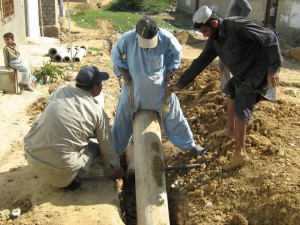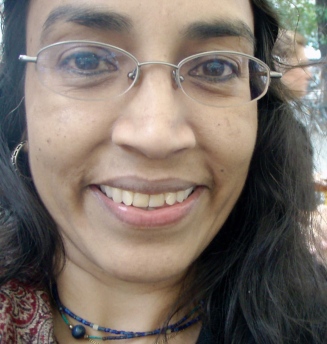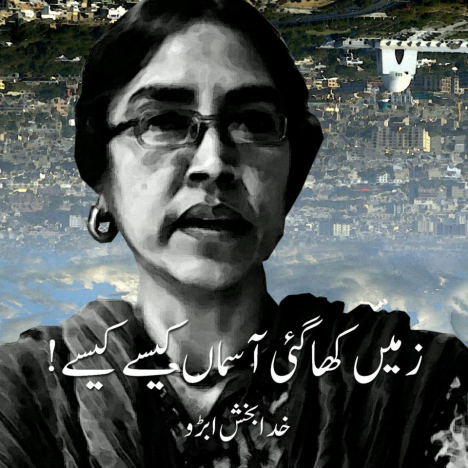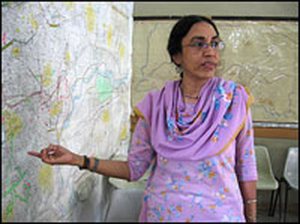The cold-blooded murder of Perween Rehman on March 13 this year came as no great surprise — in the lawless concrete jungle that is Karachi, one always expects the worst. That doesn’t mitigate the shock and immense grief at the gunning down of the gentlest of human beings, someone who had devoted her life to helping the poor, empowering the under-privileged. Below, my article on Perween in Economic and Political Weekly, India, written on March 19, 2013. Also see the these beatuiful tributes by K. B. Abro (with audio), Zameen Kha Gayi Asmaan Kaise Kaise; Zubeida Mustafa, Rest in peace little sister; and Masuma Hasan, Perween Rahman: the legend lives on
Perween Rehman
Keep the Torch Alight
Perween Rehman headed the Orangi Pilot Project in Karachi and helped empower an entire community, especially women, and spoke out against the land and drug mafi as in the city. She was assassinated in Karachi on 13 March because she took on criminal and corrupt forces in Pakistani society on behalf of the poor.
Beena Sarwar
The cold-blooded assassination of the gentle, soft-spoken development worker Perween Rehman sent shock waves around her native Karachi, around Pakistan and around the world. Her murder leaves bereft her octogenarian mother, two brothers and a sister (the writer Aquila Ismail). Not to mention other relatives and a huge number of friends, students and admirers, in particular the people of Orangi township, the sprawling low-income locality in the north-west of Karachi to the uplift of which she devoted her life.
‘Dharavi’ of Karachi
Karachi is a sprawling megapolis of over 18 million, spilling into the rocky desert that surrounds it, the Arabian Sea and the Indus River delta to its south. It is Pakistan’s largest city, business hub and major seaport. The hum of traffic – heavy industrial transport, interspersed with public and private transport, motorised and animal-driven – is a constant background noise. Many of the countless roads and flyovers that criss-cross the city have displaced human settlements inhabited by the urban poor. It was near a flyover known as the Benaras Pul that two masked men riding a motorcycle waylaid Perween’s vehicle on the afternoon of 13 March as she returned home from work. They shot her at close range and sped away, the targeted nature of the shooting apparent in their leaving alone her driver, Wali Dad. By the time he got her to the hospital, she had breathed her last, hit by at least four bullets.
Orangi where Perween, 56, worked competes with India’s Dharavi for the title of “Asia’s largest slum”, winning hands down in terms of land area, 22 square miles compared to Dharavi’s one. Its population of about 1.5 million is a bit more than Dharavi’s million. But Orangi, Perween Rehman always insisted, is “not a slum”. The word “slum”, she would say, does not do justice to its hard-working people. “People are poor but they are not destitute, they’re working class. It’s one of the poorest settlements. People have arranged their own schools, clinics and water supply. They are a great example of people helping themselves”, she told Dean Nelson of The Telegraph in 2009.

Self-help in Orangi. Arif Hasan. More photos at http://bit.ly/10JBD85
Orangi Pilot Project
Orangi’s development is so, in no small measure, due to the work of the groundbreaking Orangi Pilot Project (OPP) that the legendary development activist and social scientist Akhtar Hameed Khan, who was widely known as Khan Sahib, began in 1980. Perween had just started working as an architect at a prestigious private firm after graduating from Karachi’s Dawood College of Engineering and Technology in 1981. A few months later, persuaded by Khan Sahib she joined OPP as its joint director in 1982. She had found her calling and she never looked back.
Khan Sahib had set up the OPP along the lines of the participatory rural development programme he had pioneered in Comilla in former East Pakistan in 1959. The model is, through technical guidance, social mobilisation, and microcredit, to help poor people to dig their own sewers or water lines, build their own houses and infrastructure, run schools and clinics, or set up their own businesses. The programme also helps build up partnership between people and government, and mobilises local resources “be it the community’s or the government, so that there is no need for any World Bank, Asian Development Bank (ADB) loans or doles”, as Parveen put it in an interview with Fahad Desmukh in 2011.
A soft-spoken, humble, down-to-earth man, courteous to a fault, Khan Sahib was known as a dervish, uninterested in material gains, focused single-mindedly on uplifting the poor. His courage shone through in his quiet determination to continue his work, come what may. His protégée shared all these qualities in full measure. Khan Sahib was a great believer in the power of women. He compared himself to a grandmother – “not your grandfather, because your grandmother gives love…and through love she’s able to encourage and make people grow”, as Perween told Steve Inskeep (the author of Instant City: Life and Death in Karachi) of National Public Radio in 2010.
Women are active in Karachi’s development, but “they do not like to publicise their roles”, she said. A woman
“is in charge of the entire house, [the] entire budget. And if she’s not convinced, no money can be let out for the development. No house can be improved, no child can go and get educated. It’s a woman who [makes] the decision.
But when you go into some house, a man will come and talk and be very upfront and high profile, because by nature the women have been very gentle but persuasive. They know how to persuade their men…to do the things that they want to get done.”
That was how the women of Orangi learnt to deal with government officials who they initially found difficult, said Parveen. “If women told an official, ‘You do this, you do that’…he would start avoiding us. There are a lot of things he can’t do. The system is such. But now we go and we say, ‘We want your advice. Please tell us what to do’ and they feel very happy”, she told Steve Inskeep.
“I feel sometimes – not with men and women – with any group, if you come just upfront and try to be…the person taking credit for everything, that’s where things start going wrong. Once you rise up horizontally, you take everybody with you. But if you want to rise vertically, you will rise, but then nobody will be there for you.”
The Mother of Karachi
This nurturing, gentle approach earned her the title of “the mother of Karachi”, as many students and admirers referred to her at a protest outside the Karachi Press Club the day after her murder.
Perween Rehman had taught at her alma mater Dawood College as well as at the University of Karachi’s Visual Studies Department and the Indus Valley School of Art and Architecture. Her legacy includes “students who know the difference between a slum area and a squatter settlement”, says a former student Andaleeb Rizvi, a teacher at Karachi University, in a blog entry mourning the loss of “one of the best teachers I had a chance to interact with”.
“She taught me how ‘not to hate the poor’; not to refer to ‘katchi-abadis’ as slums and instead ‘squatter settlements’, for she said in her sweet melodious voice, Slums mean poverty, crime, hopelessness, while ‘squatter settlements’ are a hub of hope, cultural diversity, the will to make things better. Don’t you think so too? I feel we should not say ‘slums’. It sounds so wrong. She asked if I knew that people in squatter settlements take care of ebuach other more. ‘They stand up to support their neighbour if there is a problem’.
If I am aware of these nuances today, it is because of Parveen. If I disagree with the popular discourse that this country has gone to the dogs, it is because of teachers like her. People like her, who chose not to run away in the face of threats, fears of losing loved ones and being left alone to deal with problems.”
Criminality, Politics and Religion
The day after Perween’s murder, her devastated colleagues made it a point to keep the OPP office open rather than close it in mourning as might have been expected. This in itself is testament to Khan Sahib’s legacy, to Parveen’s fighting spirit and to the OPP team’s determination not to buckle under threats. Hundreds of social workers and activists from all over the city came to Orangi in solidarity.
Khan Sahib had quietly and with dignity faced his share of adversities. Powerful interests, threatened by his work that empowered the urban poor, on two separate instances filed “blasphemy” cases against him, one in Karachi in 1989, and another in Multan in 1990. There was clearly no basis for the complaints, which were clearly meant to harass the elderly social worker.
“No one can help the poor without evoking the ire of one vested interest or the other”, said I. A. Rehman at the time. Rehman is the director of the non-governmental Human Rights Commission of Pakistan which had taken up Khan Sahib’s case. The cases were eventually quashed just a few years before Khan Sahib passed away in 1999 aged 83. Aamir Mughal, a former intelligence officer who conducted the enquiry into the blasphemy case against Khan Sahib in Karachi in 1991, says that he found that “the land mafia was behind it”.
And now, just over 20 years later, the land mafia is believed to be behind the murder of Khan Sahib’s protégée. She knew she faced threats from not one, but several quarters. Recounting one of those threats (among several) to Fahad Desmukh in 2011 she recalled, “We said all you can do is kill us, yeah? What else can you do? So kill us. We’re not afraid of you. I think that is important.” (Full interview, with transcript)
But it is not so simple anymore. Over the years, criminality, politics and religion (or rather, the pretence of religion) have become increasingly intertwined in Pakistan. Many of the militants who are engaged in relentlessly attacking civilians and security forces personnel, besides schools, mosques, shrines, marketplaces and government offices around the country, draw sustenance from Karachi. Extortion, kidnappings for ransom, vehicle and cell phone thefts, burglaries and donations from shopkeepers deluded into thinking that they are contributing to an “Islamic cause” largely fund the “terror network”. In this situation, there are cases of target killings by the “Taliban” at the behest of one or other vested interest.
So it is not surprising to hear that shells from the 9 mm pistol used to kill Perween Rehman reportedly match a 9 mm pistol found on a suspected Tehreek-i-Taliban Pakistan (TTP) commander’s aide. The man was killed in a police shootout in Manghopir on the outskirts of Karachi the following day, reports The Express Tribune.
The police raid was based on information obtained from their network of informers, who “told the police Bilal was involved in Rehman’s murder. The TTP has said it was not involved. It usually claims responsibility if behind an attack”.
“The bullet shells of a 9 mm pistol used in Rehman’s attack and a 9 mm pistol found on Bilal were sent to the forensics division for a match. The expert who did the match confirmed this and that the record of Bilal’s pistol was also being cross-checked with data of around 9,000 records”, says the ET report.
Even if the TTP has denied responsibility, it is entirely possible that some of their affiliates were involved – instigated perhaps by the land mafia, which includes people from all the political parties.
A Woman in Man’s World
Parveen was not a high-profile person who came much into public view. But she was a woman in a man’s world. A woman who did not don a chaddar or a veil, although she dressed simply and conservatively, with a dupatta always draped over her shoulders completing the shalwar kameez she typically wore. She was a woman who was helping empower an entire community, which included women. There are elements in Pakistani society who do not like that.
In her few interviews Perween spoke out clearly against the land mafia and the drug mafia, as well as the political parties involved in violence in the city. She was also clear that the violence, while given an ethnic colour, was not due to ethnicity. After her murder, a mutual friend disclosed that the Taliban had in recent months attacked three of her colleagues for their work on school reforms; two were killed and one injured.
“She never sought the limelight and was rarely interviewed but her work had international recognition – she won the United Nations Habitat Award in 2001. It appears that she was aware of the threats to her life and had been so for years, probably because her work impinged on the activities of assorted land mafias and others who exploited the poor”, commented The News in an editorial:
Thus Pakistan loses another brave, devoted and resourceful person who gave her life freely in the service of the poor. Under her leadership, the OPP had managed to avoid the taint of corruption that dogs the steps of so many NGOs. Within minutes of her murder, tributes were pouring in on various social media networks from not just Pakistan but across the world. But tributes, honour and respect are no shield against a gunman’s bullet. The evil forces that killed Parveen Rehman have free range in this country, ruled as we are by the corrupt at every level who are bent on self-interest rather than the uplift of a population that is mostly poverty-stricken, has inadequate sanitation and poor drinking water supplies – all issues addressed by the OPP and Parveen Rehman. Whoever killed her, whether it was a “banned organisation” or thugs working for land mafias and encroachers, is unlikely ever to be caught, much less punished. The culture of impunity that has grown on the cancer of corruption ensures protection for even those committing the most heinous of crimes. Rest in peace, Parveen Rehman – your country is the poorer for your passing but it will only be the poor and your fellow-workers who will keep your memory alive ).
Filed under: Human rights | Tagged: Abro, Desmukh, EPW, k b abro, karachi, land mafia, Masuma Hasan, MQM, Parveen Rehman, Perween Rehman, Steve Inskeep, Taliban, Zubeida Mustafa |






Reblogged this on MedChemHot.Pakistan.
LikeLike
In which fielsd you work.
LikeLike